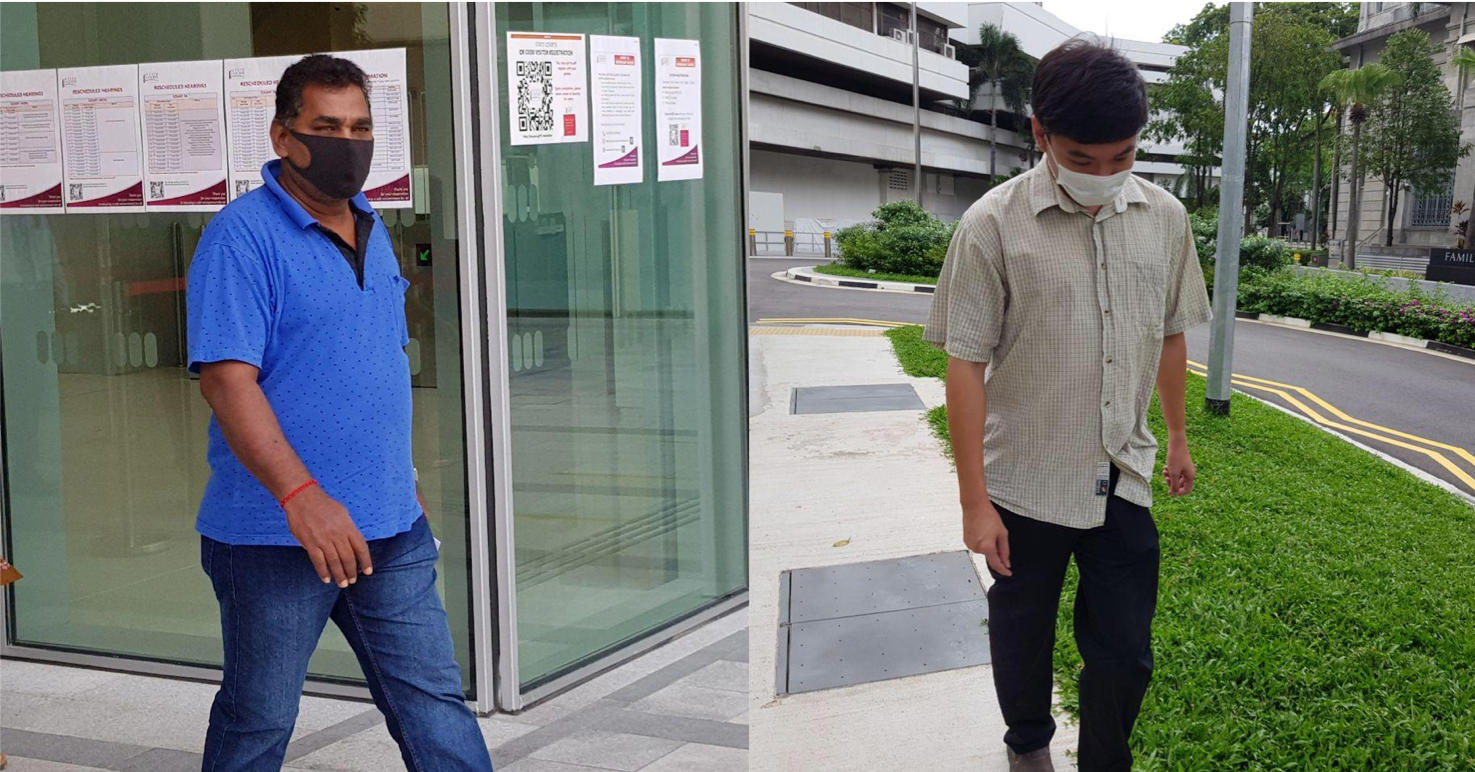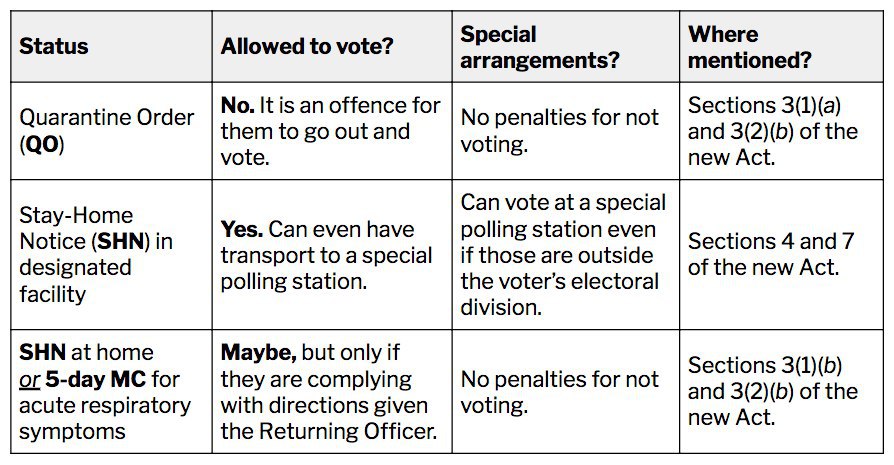Right now, Singaporeans don't know when the Covid-19 pandemic will end, or when will the next general election (GE) be held.
The only clue we have is that the latter must be held by April 14, 2021. But it's possible that the pandemic will last beyond that.
A Parliamentary Elections (Covid-19 Special Arrangements) Bill passed by Parliament on May 4 and gazetted as an Act (a legislation/law) on May 15 sets out precautions and safety measures for holding an election, while taking Covid-19 into account to safeguard public health.
But whether or not you will be allowed to vote in the next GE depends on what kind of order you are serving, and where you are being housed, if you're affected by Covid-19.
Different voting procedures depending on your health status
Voters with no Covid-19 issues
If you're an eligible voter and have no Covid-19 issues, you get to vote.
You may need to observe certain precautions, such as social-distancing in the polling stations, but you still can vote as usual at the polling stations.
But the rules are different if you have been given a Quarantine Order (QO), a Stay-Home Notice (SHN), or a five-day medical certificate for acute respiratory symptoms. Let's go through them one by one.
1. Quarantine Order
A Quarantine Order is a legal order that is different from a Stay-Home Notice. According to MOH:
"A QO is issued to quarantine, or isolate an individual who is, or is suspected to be, a carrier of an infectious disease, or a contact of a person confirmed to have an infectious disease.
This is with the aim of limiting the spread of the virus in the community.
A QO is a legal order issued to individuals under the Infectious Diseases Act. It has legal force with severe penalties for non-compliance."
A person under a Quarantine Order is required to have a dedicated room and toilet, if they are staying at home. If this is not feasible, then they have to serve the order at a Government Quarantine Facility.
Voters under Quarantine Order
A person eligible to vote in the general election, but is on a Quarantine Order, cannot break their Quarantine Order and go out to vote.
Section 3 of the Act excuses such voters from the usual penalties that apply to eligible voters who do not vote.
They will be treated as voters who have "good and sufficient reason" for not recording their vote, according to Section 43(8) of the Parliamentary Elections Act.
Their names will be restored to the register of electors without penalty.
But if they break their Order and go outside to vote, then they will be committing an offence.
2. Stay-Home Notice
Some voters may be given stay orders for health reasons, either serving a 14-day Stay-Home Notice (SHN), or someone who is issued a five-day medical certificate for having acute respiratory symptoms.
A person serving SHN is in a different position than those on Quarantine Orders.
For example, he or she does not need to have a dedicated room or toilet, although he or she is still required to remain indoors at all times during the 14-day period.
If you have been given a Stay-Home Notice, you might be serving it either at your place of residence (i.e. your own house) or a designated facility.
For example, travellers returning to Singapore from overseas serve their SHN at a designated facility, such as a hotel.
The list of designated facilities as outlined in the Act includes:
- Hotels.
- Services apartments.
- Hostels.
- Dormitories.
- Other similar boarding premises.
Voters under Stay-Home Notice at designated boarding facilities
If you're a voter serving SHN at one of these facilities, you may be able to vote at a special polling station.
There are a number of measures outlined in the Act that allows a Returning Officer to establish the special polling station.
Your vote will be counted according to the specific electoral division that you belong to.
Section 71 of the Parliamentary Elections Act usually forbids anyone from making a motor vehicle available to transport voters to or from the polls.
But Section 7 of the Act allows the Returning Officer, or anyone authorised by the Returning Officer, to arrange for motor transport for voters to get to a special polling station.
3. Exception for people serving SHN at home, hospitals or convalescent homes
But there are a third group of voters not covered in the first two groups above.
These are voters serving Stay-Home Notices outside of the list of designated facilities.
The list does not include hospitals, convalescent homes or similar institutions.
And it also does not cover people who are serving SHN or are on a five-day MC for acute respiratory symptoms at their own place of residence.
This group is referred to in Section 3(1)(b) of the Act.
So what happens?
According to Section 3(4) of the Act, voters in these circumstances may be allowed to vote, as long as they are complying with directions given by the Returning Officer, or by someone on his behalf.
These directions have yet to be outlined, but they may be similar to the precautions taken by South Korea in April.
Voters who tested positive for the virus but still wished to vote in person only did so in the evening, after everyone else had finished voting.
The officers at the voting station were also provided with full protective gear.
How things stand
Going by everything above, we have this guide:
Mothership contacted the Elections Department Singapore (ELD) to clarify whether voters housed in Community Care Facilities, such as the Singapore Expo, are considered to be under a Quarantine Order, or a Stay-Home Notice at a boarding premise.
We also asked about the status of voters at Community Recovery Facilities and Swab Isolation Facilities
ELD provided the following response on May 29:
The Elections Department will consult the Ministry of Health nearer the date of the General Election to assess the public health risks of allowing voters housed in Community Care Facilities and Swab Isolation Facilities to vote in person at polling stations. A decision will be taken based on the prevailing COVID-19 situation at that time.
Related stories:
Top image by Matthias Ang.
If you like what you read, follow us on Facebook, Instagram, Twitter and Telegram to get the latest updates.

